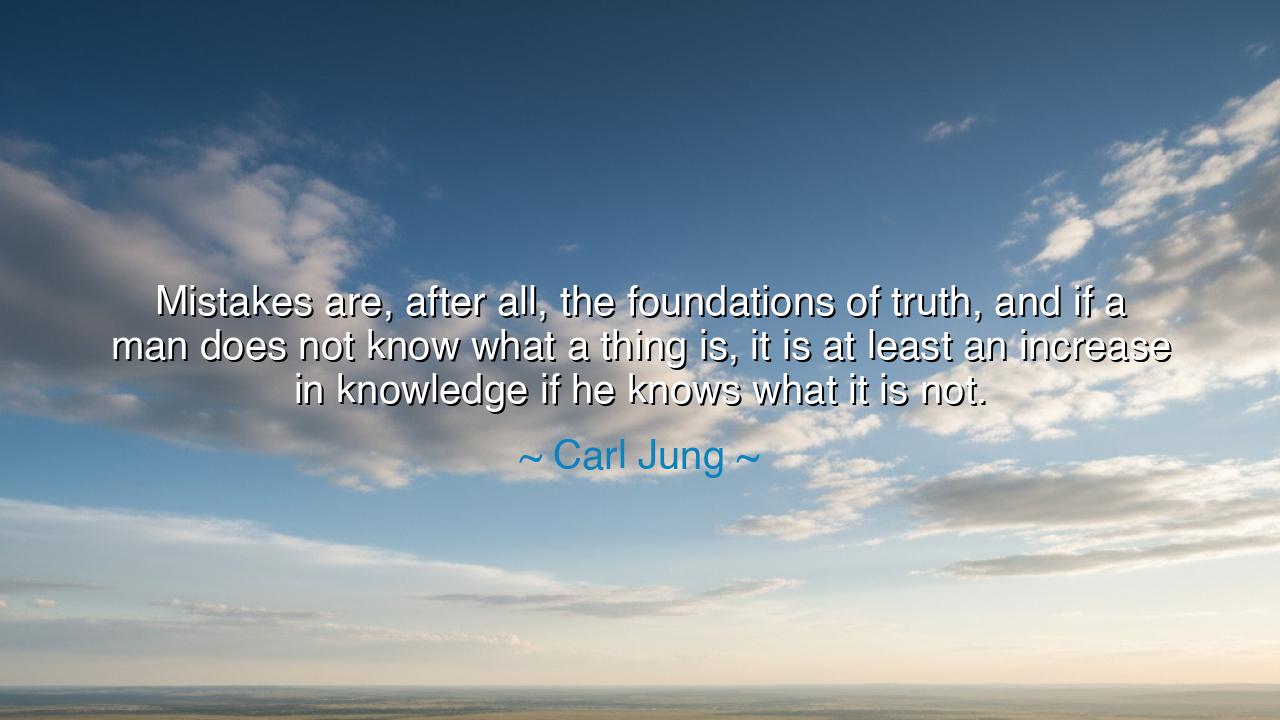
Mistakes are, after all, the foundations of truth, and if a man
Mistakes are, after all, the foundations of truth, and if a man does not know what a thing is, it is at least an increase in knowledge if he knows what it is not.






“Mistakes are, after all, the foundations of truth, and if a man does not know what a thing is, it is at least an increase in knowledge if he knows what it is not.” — Carl Jung
In these luminous words, Carl Jung, the great explorer of the human soul, offers not mere consolation for failure, but a profound revelation of its necessity. His insight pierces through the veil of shame that often covers human error, showing that mistakes are not the enemies of truth, but its midwives. To err, he tells us, is not to fall from wisdom, but to move toward it. For truth does not appear fully formed in the mind of man — it must be uncovered through struggle, contradiction, and correction. In this way, every misstep becomes a stepping-stone, every confusion a doorway through which understanding enters.
The origin of this quote lies in Jung’s lifelong journey through the landscapes of the psyche. A disciple of Sigmund Freud and later a visionary in his own right, Jung sought to uncover the deeper patterns of human consciousness. In his studies of dreams, symbols, and myths, he learned that growth is born from conflict, and that no soul reaches wisdom without first wandering in darkness. His words reflect this truth — that knowledge is not the possession of the flawless, but the reward of those who dare to question, stumble, and learn. In Jung’s vision, mistakes are not blemishes on the path of learning; they are the path itself.
The ancients, too, spoke of this truth in their own way. Socrates, the wisest of the Greeks, declared that the beginning of wisdom is to know one’s ignorance. He spent his life uncovering false assumptions, guiding others to see not what they knew, but what they did not know. Likewise, Jung’s statement mirrors that ancient humility — that every negation, every realization of error, is a victory for truth. When a man discovers what is false, he clears the ground upon which the temple of understanding may be built. Thus, knowledge does not arrive through certainty, but through correction. The sculptor does not create by adding, but by chipping away — so too the seeker of truth must cut away illusions to reveal reality.
Consider the story of Christopher Columbus, who set sail seeking a new route to Asia and instead stumbled upon a new world. History remembers his error, but it was that very mistake that transformed the map of human knowledge. He sought one truth and found another, proving Jung’s wisdom: that to know what something is not is often the first step toward knowing what it is. So too in science, in art, and in love — progress is rarely born of perfection. It is born of failure, of persistence, of the courage to be wrong and to learn from wrongness. Every truth that stands today was built upon the ruins of ten thousand errors.
Jung’s words also carry a spiritual message, one as deep as it is liberating. He reminds us that self-knowledge follows the same law. A man does not understand who he truly is until he has faced the shadows of who he is not. To confront one’s flaws, one’s illusions, one’s moral failures — this is not despair, but awakening. For in such confrontation lies the beginning of transformation. The alchemists, whom Jung often studied, believed that gold is born only through the purification of base metals. Likewise, the human spirit attains wisdom only through the fire of mistake and repentance.
And yet, in our modern world, where error is condemned and perfection idolized, Jung’s insight burns with renewed urgency. Too many fear to act, to create, to speak — lest they fail. But the avoidance of error is the avoidance of growth. A civilization that punishes mistakes too harshly condemns itself to stagnation, for without experimentation, no discovery is possible. The great inventors, poets, and prophets all understood this: that truth lives not in the avoidance of failure, but in the perseverance beyond it. The light of knowledge does not shine upon those who never stumble, but upon those who stumble and rise again.
Let this, then, be the lesson drawn from Jung’s timeless wisdom: to err is not weakness, but courage in disguise. Embrace your mistakes, not as chains of shame, but as the chisels that shape your understanding. When you fail, ask not, “Why did I fall?” but rather, “What have I learned of the ground upon which I stand?” To know what is false is to stand one step closer to what is true. And as the ancients taught and Jung affirmed, the path to enlightenment is not a straight road of triumph, but a winding ascent of trial, humility, and revelation.
So, O seeker of wisdom, remember this: truth is a fortress built upon the stones of error. Every mistake you make, every misconception you correct, is a foundation laid for the greater understanding yet to come. Do not fear to be wrong — fear only to stop seeking. For it is through error that the soul refines itself, and through imperfection that the human spirit draws near to the eternal.






AAdministratorAdministrator
Welcome, honored guests. Please leave a comment, we will respond soon